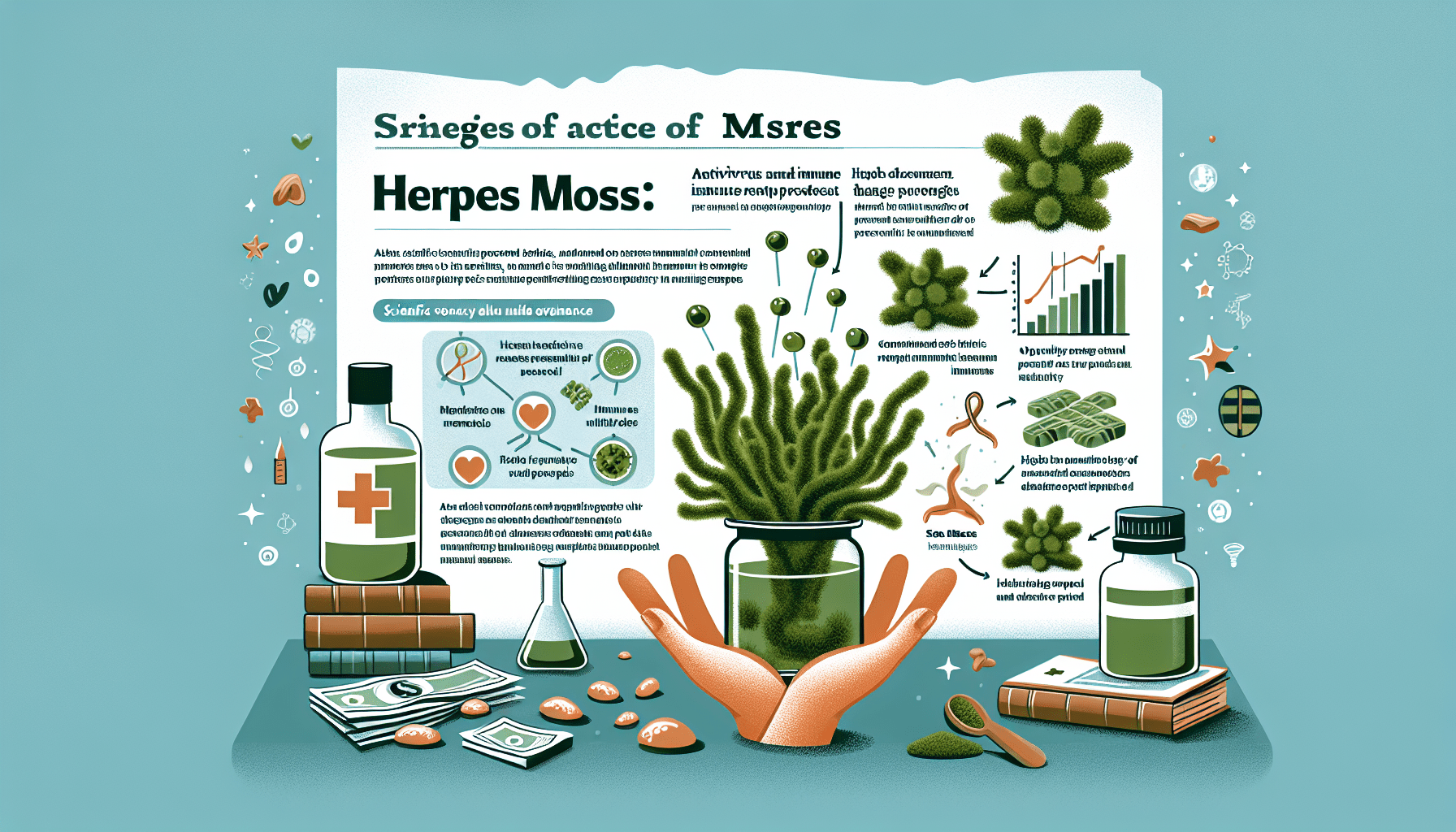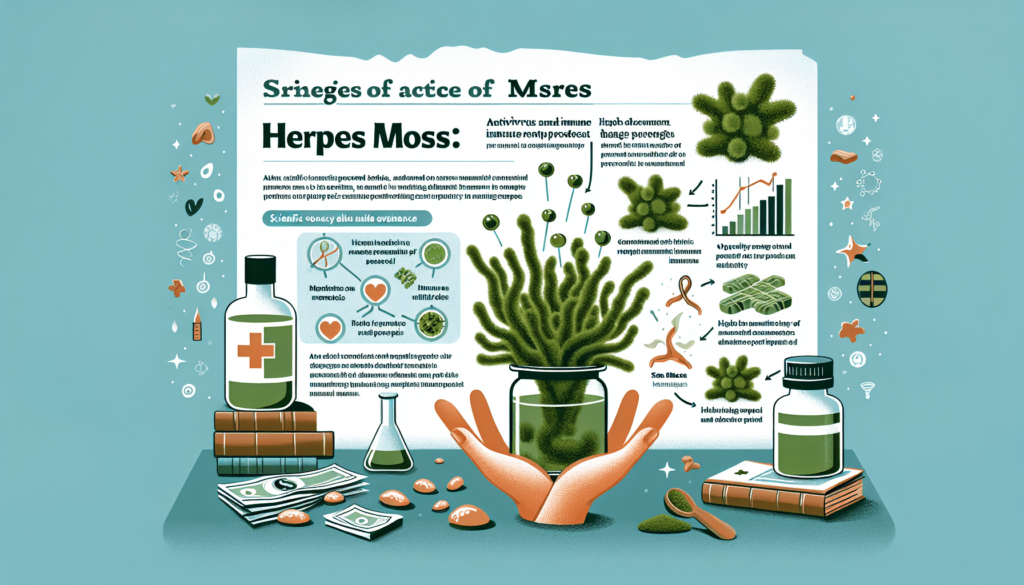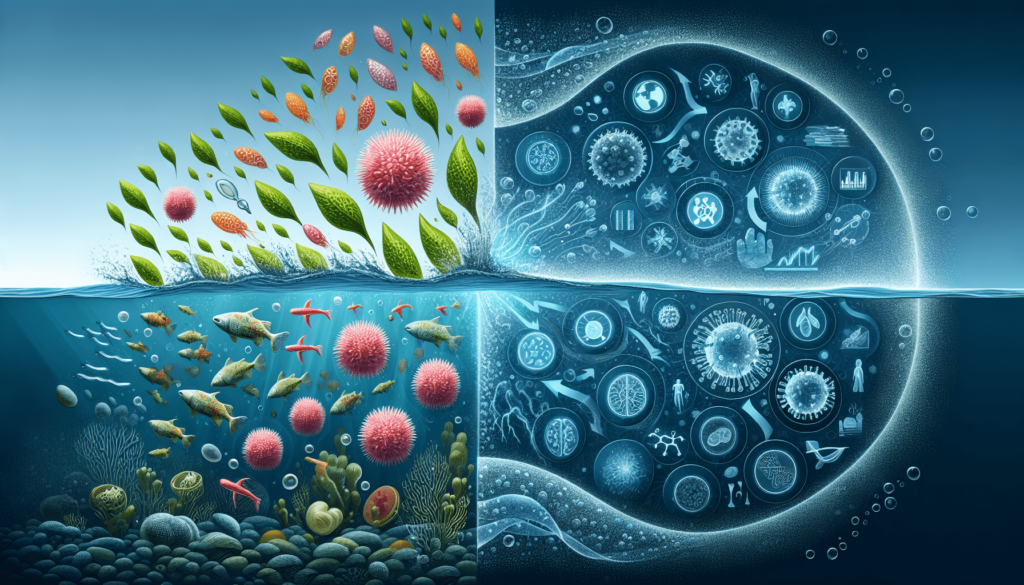The Best Fluffy Pancakes recipe you will fall in love with. Full of tips and tricks to help you make the best pancakes.

Have you ever wondered if sea moss can help with herpes? As a natural remedy gaining popularity, sea moss is being touted for its potential health benefits. One such claim is its ability to assist with herpes outbreaks. But is there any truth behind this assertion? In this article, we will explore the topic further and examine the potential benefits of sea moss for those living with herpes. So, if you’re curious to learn more about this intriguing natural remedy, keep reading!

Free Sea Moss Sexual Health Guide
What is Sea Moss?
Sea moss, also known as Irish moss, is a type of seaweed that grows in the Atlantic Ocean along the rocky coasts of Europe and North America. It has been used for centuries in traditional Irish cuisine and as a natural remedy for various ailments. Sea moss is rich in nutrients and is valued for its potential health benefits.
Origin of Sea Moss
Sea moss has a long history of use in Ireland and the Caribbean. In Irish culture, it was traditionally consumed in soups, broths, and desserts due to its thickening properties. It was also used as a remedy for coughs, sore throats, and digestive issues. In the Caribbean, sea moss has been used for generations as a dietary staple and a natural healer for common ailments.
Nutritional Profile of Sea Moss
Sea moss is packed with essential nutrients, making it a valuable addition to a balanced diet. It is a rich source of vitamins A, C, E, and K, as well as B vitamins such as folate and riboflavin. It also contains minerals like calcium, magnesium, iron, and iodine. Additionally, sea moss is a good source of dietary fiber and antioxidants.
What is Herpes?
Herpes is a viral infection caused by the herpes simplex virus (HSV). There are two main types of herpes viruses: herpes simplex virus type 1 (HSV-1) and herpes simplex virus type 2 (HSV-2). HSV-1 typically causes oral herpes, characterized by cold sores or fever blisters around the mouth. HSV-2 usually causes genital herpes, which leads to sores or blisters in the genital area.
Types of Herpes
As mentioned earlier, there are two main types of herpes viruses: HSV-1 and HSV-2. HSV-1 is primarily associated with oral infections, while HSV-2 is mainly responsible for genital infections. However, it’s important to note that both types can infect either location. Additionally, HSV-1 can also cause genital herpes through oral-genital contact.
Symptoms of Herpes
The symptoms of herpes vary depending on the type of infection and the location of the outbreak. Common symptoms include the appearance of painful blisters or sores, itching or tingling sensation, swollen lymph nodes, and flu-like symptoms such as fever and fatigue. It is important to consult a healthcare professional for a proper diagnosis and guidance on managing the symptoms.
Traditional Beliefs and Remedies
Sea moss has been used for centuries in traditional medicine to support overall health and treat various conditions. It has been considered a natural remedy for respiratory issues, digestive problems, and skin ailments. The rich nutrient content of sea moss is believed to contribute to its traditional healing properties.
Historical Use of Sea Moss
In Irish folklore, sea moss was considered a food of the gods and was believed to have protective powers. It was often used as a natural remedy for coughs, colds, and congestion. In Caribbean cultures, it was consumed as a tonic for vitality and considered a tonic for general health, as well as being used to ease digestive discomfort.
Claimed Benefits of Sea Moss
Sea moss enthusiasts claim that it may have potential therapeutic benefits, including alleviating cold and flu symptoms, boosting the immune system, aiding digestion, and promoting healthy skin. While these claims are largely based on anecdotal evidence and traditional beliefs, scientific research is being conducted to explore the potential benefits of sea moss.
Scientific Research
Several scientific studies have focused on the potential effects of sea moss, including its antiviral properties and its impact on the immune system. While research on the specific impact of sea moss on herpes is limited, some studies have shown promising results in terms of its antiviral activity and potential immune-enhancing effects.
Studies on Sea Moss and Herpes
A few small studies have investigated the antiviral properties of sea moss extracts and their potential in managing herpes infections. One study found that certain compounds in sea moss demonstrated antiviral activity against herpes simplex viruses in laboratory settings. However, further research is needed to determine the effectiveness of sea moss as a herpes treatment in humans.
Effectiveness of Sea Moss for Herpes
It is important to note that while sea moss may have potential antiviral properties, it should not be considered a standalone treatment for herpes or any other condition. More rigorous research and clinical trials are necessary to fully understand the effectiveness and safety of using sea moss for managing herpes infections. It is always best to consult a healthcare professional for personalized advice and guidance.
Nutrient Content and Mechanisms
Sea moss contains various bioactive compounds that may contribute to its potential health benefits. Some of these compounds, such as carrageenans and sulfated polysaccharides, have been found to have antiviral properties that could potentially help in managing herpes infections. Additionally, sea moss is rich in nutrients that support overall immune function and promote healthy skin.
Antiviral Properties of Sea Moss
Certain compounds found in sea moss have shown antiviral activity in laboratory studies. These compounds may help inhibit the replication of herpes viruses and reduce the severity and duration of outbreaks. However, further research is needed to understand the mechanisms of action and potential clinical implications.

Immune System Enhancement
Sea moss is packed with vitamins, minerals, and antioxidants that support a healthy immune system. A strong immune system is essential for fighting off viral infections, including herpes. By providing essential nutrients, sea moss may help enhance immune function and contribute to overall well-being.
Supporting Skin Health
The vitamins and minerals in sea moss, along with its potential antiviral properties, may also have a positive impact on skin health. Some individuals claim that incorporating sea moss into their skincare routine has helped reduce inflammation, soothe irritated skin, and promote a more radiant complexion. However, scientific research in this area is limited, and more studies are needed to establish any potential benefits.
Preparation and Dosage
Sea moss is available in various forms, including dried seaweed, powdered supplements, and gel preparations. It can be incorporated into a variety of recipes or consumed as a dietary supplement. It is important to follow proper preparation methods to ensure safety and maximize the potential benefits of sea moss.
Forms of Sea Moss
Sea moss is commonly available in dried form, which requires rehydration before use. It can also be purchased as a powder or in gel form, which can be easier to incorporate into recipes or consume as a supplement. Choosing the most convenient form of sea moss depends on personal preference and the desired method of consumption.
Methods of Preparation
To prepare dried sea moss, it must be soaked in water for several hours until it expands and softens. After rinsing thoroughly, it can be blended with water to create a gel-like consistency or used as an ingredient in various recipes. Powdered sea moss can be mixed with liquids or food, while gel preparations can be consumed directly or incorporated into smoothies, desserts, or topical applications.
Recommended Dosage of Sea Moss
There is no established standard dosage for sea moss, as it varies depending on individual needs and preferences. It is recommended to start with a small amount and gradually increase the dosage if desired. As with any dietary supplement, it is important to follow the instructions on the product packaging and consult a healthcare professional for personalized advice.
Possible Side Effects
While sea moss is generally considered safe for consumption, it may cause side effects in some individuals. Allergic reactions, such as rashes or hives, have been reported in rare cases. Additionally, excessive consumption or improper preparation of sea moss may lead to digestive issues such as bloating, gas, or diarrhea. It is important to listen to your body and discontinue use if any adverse reactions occur.
Allergic Reactions
Individuals with seaweed or iodine allergies may be at a higher risk of experiencing allergic reactions to sea moss. It is important to be aware of any known allergies and to read product labels carefully. If you have a known allergy or have experienced allergic reactions to seaweed products in the past, it is best to avoid sea moss or consult a healthcare professional before use.
Digestive Issues
Consuming excessive amounts of sea moss, especially if not properly prepared, may cause digestive discomfort. This can manifest as bloating, gas, or diarrhea. To minimize the risk of digestive issues, it is recommended to start with small amounts and gradually increase the dosage as tolerated. Proper preparation methods, such as thorough rinsing and soaking, can also help reduce the risk of digestive problems.
Consultation with a Healthcare Professional
If you are considering incorporating sea moss into your healthcare routine, it is always best to consult with a healthcare professional, especially if you have any pre-existing medical conditions or are taking medications. They can provide personalized advice, assess any potential risks or interactions, and guide you on the appropriate dosage and usage.
Lifestyle Modifications
While sea moss may have potential benefits for managing herpes outbreaks, it is important to remember that lifestyle modifications play a crucial role in managing the condition. Practicing safe sex, maintaining a healthy diet, managing stress levels, and getting regular exercise are all important factors in supporting overall health and managing herpes infections.
Conclusion
Sea moss, with its rich nutrient content and potential health benefits, has gained attention as a potential natural remedy for various ailments, including herpes. While research on the specific effects of sea moss on herpes is limited, some studies suggest promising results in terms of its antiviral properties and immune-enhancing effects. However, it is important to note that sea moss should not be considered a standalone treatment for herpes, and further research is needed to understand its full potential. As always, it is best to consult a healthcare professional for personalized advice and guidance on managing herpes and incorporating sea moss into your healthcare routine.





